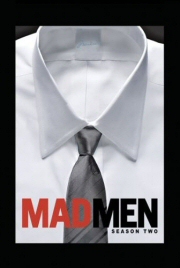- Drama
- 2008
- Buy the DVD
All photos © AMC
Reviewed by Will Harris
()
atthew Weiner must’ve really been sweating it on July 27, 2008. And yes, as you’ve probably already guessed, that’s the date that the first episode of “Mad Men: Season Two” premiered on AMC. The first season of the show had been rapturously received by the critics, singlehandedly turning the network formally known as American Movie Classics into the latest place on the basic cable dial to find top-notch original drama. Everyone was chomping at the bit to see what Weiner – who created the series – would come up with for the second season of ad men adventures, and the cynics were gleefully prepared to start throwing out phrases like “sophomore slump” and “the magic is gone.”
Sorry, cynics: “Mad Men: Season Two” is just as good as the season that preceded it.
It’s no wonder that critics have devoured this series: it looks great, the writing is top-notch, and it manages to capture the feel of a bygone era without feeling cloying or heavy-handed. Season Two only jumps slightly ahead in time from Season One, finding the ‘60s in full swing and America basking in the reign of JFK. It’s a time in history that can be easily seen through rose-colored glasses, and since the job of the ad man is to paint that kind of world, it’s no wonder that one of their campaign suggestions during the course of this season involves the suggestion that inside every woman are two sides: their Jackie Kennedy and their Marilyn Monroe. As it happens, the campaign doesn’t move forward, which works out well for the boys at Sterling Cooper when Ms. Monroe dies, an event which results in the company’s secretarial pool coming to a sobbing standstill. It isn’t the only time a real-life incident causes ripples in a campaign, either: the storyline where Pete (Vincent Kartheiser) has to come to terms with his father’s death in an airplane crash while still towing the company line in order to try and secure the American Airlines account is one of the most enthralling of the season’s early episodes.
Weiner avoids letting “Mad Men” get too steeped in soap opera, making sure to keep the firm’s dealings with Utz, Heineken, and various other Sterling Cooper clients key to the drama. It’s remarkable, then, that he still manages to offer up significant storylines to virtually every single member of the show’s ensemble. As is to be expected, it’s Don Draper who drives the series as often as not, with Jon Hamm continuing to make the character likeable despite his plethora of shortcomings as a husband and father. The first half of Season Two gives us a Don who seems almost completely unchanged from the lothario and semi-alcoholic he was in Season One, but during his trip to California, we see a whole new side of the guy – and he sees a whole new side of himself, too. Meanwhile, Betty finally reaches a point where she’s mad as hell and isn’t going to take it from Don anymore, though she veers uncomfortably close to madness before she finally makes that decision.
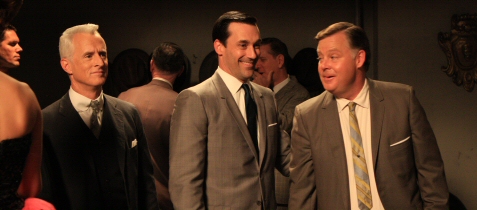
The relationship between Roger Sterling and Joan Holloway may be over, but each has their own problems in their current romantic scenarios, with Joan’s issues with her fiancé physical and Sterling’s more emotional, in that he’s left his wife for a decidedly younger woman. There’s also a considerable amount of material gleaned from the struggle of women in the workplace, with Peggy working her way up in the company even as Joan finds herself unable to do so. Duck Phillips is a major player in Season Two, battling with Don at every turn while still trying to prove his worth within the company, resulting in a power play at season’s end. Even the lesser characters get moments in the sun, as we see Paul dealing with being part of an interracial relationship, Salvatore developing a crush on Ken, and Harry standing up for himself and becoming the head of the firm’s television department. Perhaps the most surprising storyline, however, is that of Freddy Rumsen, who serves as a harbinger of a new era where you can’t always be drunk at work and get away with it. My God, what’s next: one of the guys gets lung cancer from smoking too much?
If there’s one thing in particular that makes “Mad Men” stand out, it’s the fact that it follows a slow and studied speed that would never pass muster on the broadcast networks. This is never more obvious than with the interweaved storylines of Peggy Olson and Pete Campbell, who came together in a decidedly physical fashion during Season One, resulting in the season finale surprise that Peggy was giving birth to Pete’s baby. Throughout the hiatus, viewers wondered how things would play out between the two of them come the show’s second season – and they kept wondering. We discover that Peggy kept quiet about the baby (everyone presumed she went to a fat farm, since she came back to work looking more slim than when she’d left) and couldn’t be more indifferent to her secret child, and we also learn that Pete and his wife are struggling and failing to get pregnant. It isn’t until the very end of the season, however, that there’s finally a discussion between the two of them where Peggy reveals Pete’s parenthood, and boy, is it a harsh one.
Although the concerns of the Cuba Missile Crisis rear their head by season’s end, Weiner pointedly ends things prior to JFK’s assassination, but a considerable amount of historical and emotional ground has been covered nonetheless. Sophomore slump? Not even remotely. “Mad Men: Season Two” is another season of brilliance, and Season Three can’t get here quickly enough.
Special Features: In addition to audio commentaries from the cast and crew on all 13 episodes, the set includes several excellent featurettes. In a method reminiscent of “The Young Indiana Jones Chronicles,” there’s a recurring feature on each of the discs called “Time Capsule,” which delves into real-life events which occur during the various episodes, from the Kennedys to “The Man Who Shot Liberty Valance.” There’s also a two-party documentary entitled “Birth of an Independent Woman,” which talks about the rise of feminism during the ‘60s, and “An Era of Style,” an interesting look into the fashion of the time period.
 |
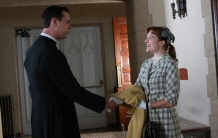 |
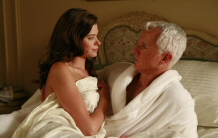 |
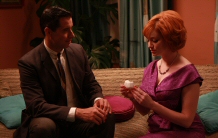 |
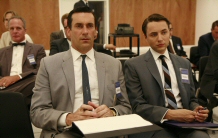 |
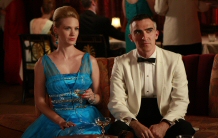 |
You can follow us on Twitter and Facebook for content updates. Also, sign up for our email list for weekly updates and check us out on Google+ as well.













